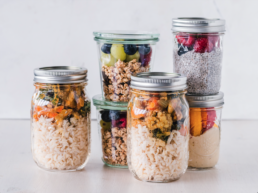By Jina Berro, First Mile Care DPP Coach
The holiday season is probably the most challenging time of the year to stay on track with your healthy lifestyle goals. Your usual routines are disrupted. There is so much tempting food and drink at celebrations with friends and family. There’s added stress (and cost!) if you’re hosting get-togethers or out-of-town visitors, or are taking your own getaway.
Moreover, some people struggle with Seasonal Affective Disorder (SAD) or other types of end-of-year melancholy that can impact their enjoyment of the festivities and trigger old, unhealthy behaviors. Even if you’re in great spirits and looking forward to fun times and a healthy life balance in the new year, you’ll probably eat more and exercise less due to packing in more activities than usual during this period. But that’s OK! Setbacks naturally occur during the process of building long-term lifestyle change. You can get back on track after a lapse.
It can help a LOT if family, friends, and co-workers are on board with your new healthy habits and are cheering you on to make them stick.
However, while they care about you and want you to be well, they may be puzzled at the changes you’re making. For example, you’re spending more time on exercising and less on shopping or playing video games. You want to skip the drive-through lane at the burger joint to eat at home. You’re buying different groceries. You’re bringing your own lunch to the office instead of eating out. You’re holding walking meetings. You’ve changed your work schedule to accommodate gym time. You’ve cut back on happy hours after work. You’ve set up a sleep routine. You’ve even started to meditate!
They may not know how to support your efforts. It’s up to you to tell them.
Asking for help
You can start by explaining prediabetes and your participation in the First Mile Care Diabetes Prevention Program (DPP) to stop the development of type 2 diabetes. Ask them nicely to openly encourage your efforts to lead a healthy lifestyle, discuss your triggers for unhealthy behaviors, and give them regular updates on your progress.
You could also invite them to help you plan, shop for, cook, and eat healthy meals with you. If you have to, establish some family rules — keeping crunchy veggies and low-fat dips as a snack at home, for example, instead of packages of chips. (They can eat chips, just don’t tempt you with them.) You can also ask them to join in the physical fitness activities you participate in, as a way to spend more time together and make the activities more enjoyable. Nevertheless, there may still be some people who just don’t understand the growth mindset you’re cultivating, so you need to find ways to manage temptations when you’re around them. (Perhaps only spend time with them when another, more supportive person is with you.)
A key component of the First Mile Care DPP is to connect participants in the same ZIP code and help them to learn from each other, as First Mile Care founder Karl Ronn explained in his article in Medical Economics. If you need additional support beyond what you’re already already getting in your First Mile Care DPP group, check with your local library, recreation center, community center, or senior center. There are probably in-person or online neighborhood groups, classes, and clubs that can help your efforts at a healthy lifestyle, whether cooking classes or physical activity such as team sports, martial arts, weight lifting, dancing, and hiking (despite the winter weather). Community service and volunteering, or arts and crafts groups, may also help relieve the stress that can cause you to go off-track with your goals.
People who need people…
If the holiday season or winter doldrums start to get you down, keep reminding yourself that you’re not alone, and most people genuinely want you to succeed. To paraphrase the old Broadway chestnut, people who need other people are the luckiest in the world.
Be open with family, friends, and co-workers about what you’re doing, why you’re doing it, and the kind of support you would find helpful from them. Your First Mile Care DPP coach and cohorts, as well as your primary care physician — who probably referred you to the First Mile Care program – are here to help.
To learn more about how you can benefit from the First Mile Care Diabetes Prevention Program, take the prediabetes risk test and get started today!



